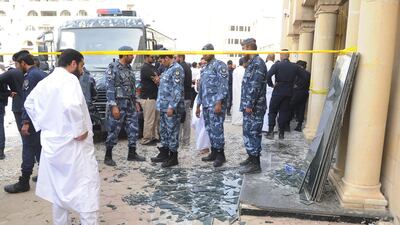The terrorist attacks in Kuwait, Tunisia and France have shocked the international community, clearly signifying a surge of extremism that is quickly spreading beyond the borders of countries first affected by groups such as ISIL.
In the Abu Dhabi-based daily Al Ittihad, the Arabic language sister newspaper of The National, editor-in-chief Mohammed Al Hammadi described “the age of ISIL” as a time of beheadings, of burning men alive and exhibiting the range of methods of human torture through photos and videos taken with the latest technology.
“Is this the end of humane civility? Does this mark the beginning of an era of chaos and barbarism?” he asked.
“Such are the questions that arise after the series of events our world has witnessed and acts perpetrated by ISIL and western terrorists, or the disturbed and psychologically ill individuals, as the West prefers to call them. The latest example of this was the killing of nine African-Americans who were praying in a church in Charleston, South Carolina.
“Many crimes in the United States and in Europe preceded this one. Terrorism, violence. killing innocents and shedding human blood are no longer Arab or Muslim affairs, as the western media have tried to communicate to their audiences. Nor is it a Sunni versus Shiite matter, or one of Muslims versus Christians. It is a problem that affects humanity as a whole.
“Terrorism touched three continents at once, killing hundreds of people, whether in Kuwait, Tunisia, Syria, Somalia or France, and this will not be the last time, as their threats are endless. But the free world is hesitant about real, practical and quick action to tackle such terrorism.
“Finding the killer is no longer a problem and is of no interest to people. Finding the instigator is of greater importance and so is finding the motive.”
Al Hammadi concluded that no single state or even group of states can counter terrorism. “Vanquishing such terrorist and extremist ideology requires concerted international efforts and cooperation to the highest limits .”
In an editorial for the pan-Arab daily Al Hayat, Ghassan Charbel remarked that “one must not say that Tunisia is far away and that it was touched by Libyan winds and old Algerian winds and by the participation of some of its nationals in the wars of Iraq and Syria. Don’t say that your country is far from these events. Don’t say that Kuwait is far away or that the bloodbath it suffered will not happen in your capital. Don’t say that France is far away and that the conditions behind the attack there do not apply in your own society.”
He warned against trying to run, as he put it because “ISIL is either at the borders or within. Such is not a war between ‘others’ and on ‘other’ territories.”
Nowhere and no one was safe, wrote Charbel and it was pointless to think that innocence was a protection of any sort or “that distance will keep anyone safe from gunfire.
Describing the spread of terrorism as a “roving massacre”, he warned that it “excludes no one. It concerns you as well as your children, your safety, that of your country and that of your grandchildren.”
Consequently, he cautioned against washing one’s hands of the matter. It concerns everyone even if “those who died are not your countrymen, nor from your religion or sect,” he wrote.
“This is an open war, a long and a bitter war, You are part of that war and have no choice but to choose moderation.
“The only way to save your country and your children is not to evade the subject,” he wrote. “We cannot wash our hands of this.”
*Translated by Carla Mirza
CMirza@thenational.ae

